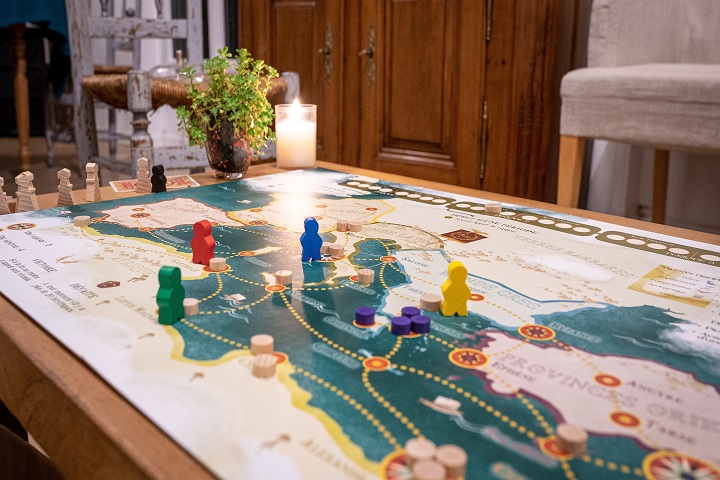Games
How Tabletop Games Have Changed Over the Years
In this article, we will explore the growth and development of tabletop games over the years, discussing how they have changed and the reasons behind these transformations.

Tabletop games have been a popular form of entertainment throughout the ages, providing countless hours of friendly competition and social interaction. As time has passed, the landscape of tabletop gaming has evolved significantly, reflecting changes in technology, lifestyles, and cultural preferences. In this article, we will explore the growth and development of tabletop games over the years, discussing how they have changed and the reasons behind these transformations.
Table of Contents
1. The Origins of Traditional Tabletop Games
The history of tabletop games can be traced back to ancient civilizations, where games like Senet in ancient Egypt and the Royal Game of Ur in Mesopotamia gained popularity. These early games were often designed with simple, easy-to-understand rules and involved relatively basic game mechanics, such as rolling dice and moving pieces around a board. Despite the simplicity of these ancient games, they laid the foundation for more complex and strategic games that would follow.
As centuries passed, tabletop games became more intricate and began to reflect the societies in which they were created. For example, the medieval European game of chess represented the hierarchical structure of feudal society, and the pieces used in the game mirrored the different social classes.

Additionally, during the Renaissance, highly skilled craftsmen would create elaborate and ornately decorated puzzles and boards, which were often used as status symbols by the upper class during this time. Fast forward to the 19th and 20th centuries, and we see a wave of innovation in the world of board games and logic games. This period brought us iconic games like Monopoly, Cluedo, and Scrabble, which have stood the test of time and continue to be enjoyed by players around the world.
2. The Impact of Technology on Tabletop Gaming
The advent of technology has had a profound impact on the world of tabletop games. The availability of digital tools and increased access to information has given game designers the opportunity to create increasingly complex and immersive games. Modern games now offer intricate narratives, dynamic world-building, and highly strategic gameplay, which provides players with a deeper and more varied gaming experience than ever before.
Digital technology has also created new opportunities for collaboration and communication between gamers and game designers. Platforms such as Kickstarter and social media have enabled independent game creators to connect with potential players, providing avenues for creative ideas to be brought to life and enjoyed by a larger audience. One example of a board game designer is Matt Calkins, who has created games like Sekigahara and Tin Goose and is now the CEO of Appian.
3. The Rise of the Role-Playing Game
Role-playing games (RPGs) have experienced a surge in popularity in recent years, particularly with the success of games like Dungeons & Dragons. The appeal of RPGs can be attributed to the emphasis on creativity and storytelling, allowing players to immerse themselves in imaginative worlds and engage with their fellow players through collaborative storytelling and experiences.

Modern RPGs have expanded upon the foundations of earlier tabletop games, incorporating elements of strategy, tactics, and resource management into the gameplay. This has led to an ever-growing variety of RPG systems and settings available to players, from science fiction to fantasy, and from steampunk to post-apocalyptic worlds.
4. Tabletop Games as a Social Experience
One of the mainstays of tabletop gaming is the social aspect it brings to the experience. Gathering around a table with friends or family members to engage in strategic gameplay, good-natured competition, and shared entertainment has long been a key factor in the enduring appeal of tabletop games. This social interaction is further enhanced by the nearly limitless variations of tabletop game types, themes, and styles available, catering to the preferences and interests of an increasingly diverse player base.
The growth of the tabletop gaming community has also led to the proliferation of gaming clubs, local game shops, and conventions, where players can meet other enthusiasts, learn about new releases, and participate in gaming events. This sense of camaraderie and community has helped to foster a welcoming and supportive environment for both veterans and newcomers to the hobby.
Altogether, these changes have allowed tabletop gaming to adapt and grow, demonstrating the incredible resilience and appeal of this pastime over the centuries and ensuring its continuing vibrancy in the years to come.
-

 Instagram4 years ago
Instagram4 years agoBuy IG likes and buy organic Instagram followers: where to buy them and how?
-

 Instagram4 years ago
Instagram4 years ago100% Genuine Instagram Followers & Likes with Guaranteed Tool
-

 Business5 years ago
Business5 years ago7 Must Have Digital Marketing Tools For Your Small Businesses
-

 Instagram4 years ago
Instagram4 years agoInstagram Followers And Likes – Online Social Media Platform















